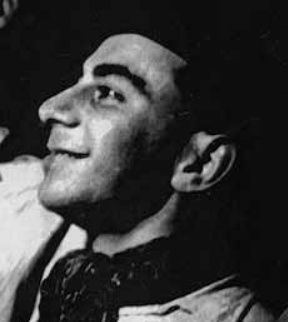
Karel Schwenk was a young Jewish entertainer who created a cabaret in a concentration camp to lift the spirits of his fellow inmates.
Born in 1917, Karel was already making people laugh as a toddler. By the time he was a teenager, Karel was part of an avant garde theater group known as “The Club of Wasted Talents.” He served as actor, director, writer, and composer.
Despite Karel’s growing fame, he was on the very first transport to Terezin on November 24, 1941 – one of 342 young Jewish men sent to prepare the camp for large influxes of prisoners.
Karel brought a poetry anthology with him to inspire the other inmates. Soon after arriving at Terezin, he created a cabaret to entertain the inmates. The variety shows featured music and comedy, including stand-up, improv and subversive satire. The Nazis allowed these shows as a way to keep the inmates from making trouble.
The cabaret was held in an attic, and hundreds of inmates showed up to each performance. The first show was called The Lost Food Card. The finale was the catchy song “The Terezin March” which became the unofficial anthem of the camp and expressed the pain of the present and hope for the future.
Karel wrote, produced and starred in several cabaret shows during his 3 years at Terezin, including Long Live Life, or Dance Around a Skeleton, and The Same But Different.
On October 1, 1944, he was among hundreds of people sent to Auschwitz, and from there to Meuselwitz, a slave labor camp.
A survivor remembered, “I was with Karel Schwenk in Meuselwitz. Many had only rags on their feet. Nobody had warm clothes for protection from the piercing cold. And we were working with steel sheets… We collected bread as much as we could, and persuaded Schwenk to sing, ‘Where there’s a will there’s a way… On the ruins of the ghetto we will laugh!’ Schwenk was waning before our eyes. It was his last entrance. His song meant more to us than bread.”
After three years of using every last shred of strength to lift the spirits of those around him, Karel was a broken man. A close friend and fellow actor who was in the slave labor camp with him wrote that Schwenk, “a man who was so immensely popular… overwhelmingly interesting… a legendary person… now bears hunger with difficulty and above all he is freezing during work that is too hard for him. He is quarrelsome, hysterical and rather unpopular.”
Karel was among the prisoners sent on a death march in April 1945 after the Nazis evacuated the camp as the Allied armies grew closer.
In April 1945, as the Allied armies approached Meuselwitz, the Nazis sent Karel and other prisoners on a death march. Karel was so weakened that he could not keep up with the marchers. His friends left him in a barn, covered in straw to warm his emaciated body. He died there alone, just a few weeks before the war in Europe ended.
For bringing music and laughter to hell on earth, we honor Karel Schwenk as this week’s Thursday Hero.
Get the best of Accidental Talmudist in your inbox: sign up for our weekly newsletter.